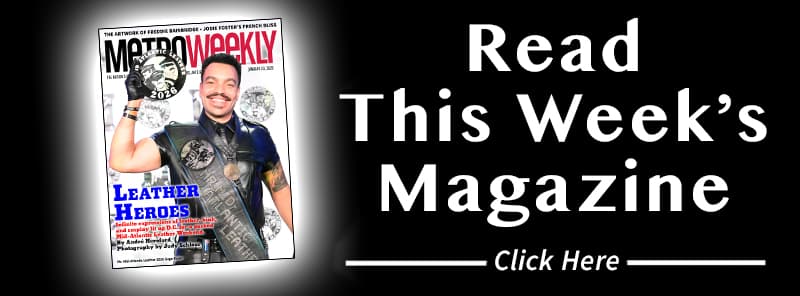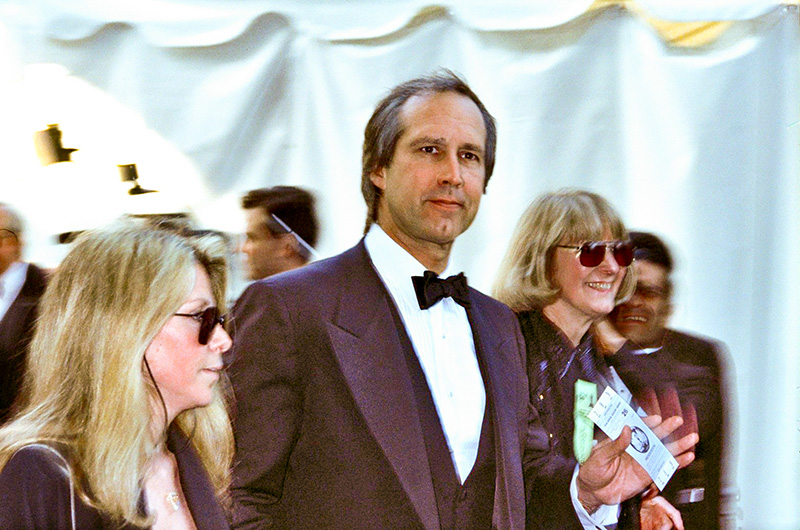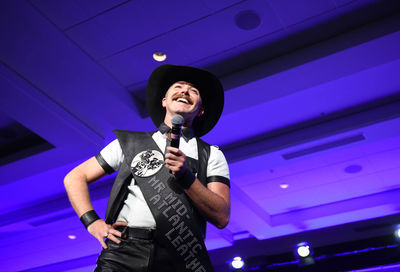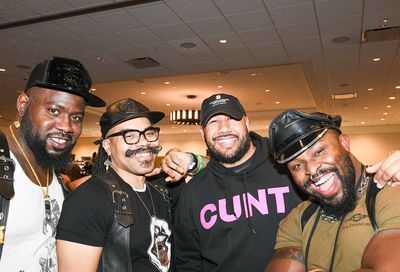Lily Tomlin
The actress discusses her career, her upcoming show at Bethesda's Strathmore, and life with her partner Jane Wagner
Do Ernestine!
The plea perches in the back of your head, chirping incessantly, while you talk to Lily Tomlin.
Please, PLEASE do Ernestine. Or Edith Ann. Or… or… Trudy the Bag Lady!
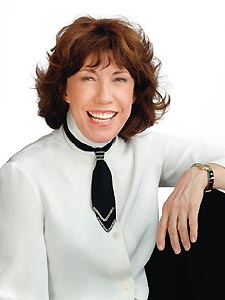 Lily Tomlin |
Of course, you stifle it, ignore it, push it away. Because it would be oh-God-so-wrong to ask one of the greatest comediennes of our day for a private command performance.
But fandom — even for a journalist — is a hard thing to repress.
Do Lud & Marie!
It’s just you and Lily. And Lily is more than enough, every bit as enchanting and brilliant and memorable as the characters she creates.
And this Saturday, April 29, she brings those wondrous creations to Bethesda’s Strathmore, where she’ll perform “an evening of classic Lily Tomlin” for the arts center’s annual gala. It’s certain to be an unforgettable evening.
Tomlin’s career — rich, long, varied — is itself unforgettable. Her work in the ’60s on Laugh-In. Her compelling screen debut as a depressed housewife in Robert Altman’s 1975 masterpiece Nashville. Her Broadway hits, Appearing Nitely and the magical The Search for Signs of Intelligent Life in the Universe, written by Tomlin’s longtime companion — and frequent collaborator in creativity — Jane Wagner.
Recently, there’s been a bit of a Tomlin surge, what with the DVD re-release of the classic office comedy 9 to 5, and a new Altman movie — A Prairie Home Companion — waiting in the wings for an early June nod. Tomlin gave us an idea of what to expect from Prairie, when she and co-star Meryl Steep performed an inspired, hilarious bit on this year’s Oscars. It became the talk of the show.
As a lesbian, Tomlin never had a “formal” coming out in the media, although her relationship with Wagner has been documented from its earliest days. Where once she might have been guarded, today she is frank and forthcoming about her relationship and the importance it’s had on her life, both from a personal and a professional perspective.
Do Ernestine!
There it is again, dammit. You can’t completely shove it out of your mind. Hope springs eternal that she’ll just launch into one of the beloved beings on her own, without prompting.
But really, when talking to Lily Tomlin, you need no comic distillation, no help from an additional cast of characters.
Because pure, undiluted Lily is more than enough to satisfy.
METRO WEEKLY: I’d like to start with that absolutely amazing bit that you and Meryl Streep did recently on the Oscars when you introduced Robert Altman. It was just about the best thing on the show. How did that come about?
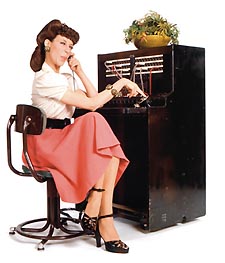 ‘Ernestine’ |
LILY TOMLIN: We wanted to do it for Bob, and we knew we shouldn’t be reverential — he wouldn’t like that. But we wanted to have enough solid stuff in the body of it, praising Altman for his originality.
We thought that the style of overlapping dialogue would be good. My partner, Jane [Wagner], wrote the body of it. But we didn’t assign it to anyone and we didn’t rehearse it. We knew what the essential “story” was, honoring Altman, alluding to his career. It leaves you pretty much in the moment because you’re not rehearsed, and no one has been assigned a particular line.
MW: Were you surprised by how well it went?
TOMLIN: Yes. Truthfully, we were pretty nervous. It’s nerve-wracking to go on the Oscars anyway — the level of criticism is so superficial, it’s totally humiliating. If it goes badly or if you wear the wrong thing, [the media] will take a potshot at you. I doubt if either one of us would have done anything like that for anyone other than Bob.
MW: He’s been an important director in your career.
TOMLIN: He has. He gave me my first movie role [in Nashville], and I’ve done two movies with him since. And I did a bit part in The Player. Here’s how Altman works. If someone comes and visits the set, very often you’ll find them in the movie — he’ll just find some way to put them in. [When he was making The Player] I was near the studio where he was shooting, so they called me at my house and said, ”Can you come over later today? Bob wants you to do something in the movie.” So I just took an old vintage bathrobe over and did it.
MW: How was the experience making Prairie Home Companion?
TOMLIN: It was like a double dose of brilliance. I had Bob and Meryl. Meryl and I did our sister singing act, the Johnson Girls. I sang the harmony, so I studied for a couple of months before I went, because Meryl is a pretty good singer. She’s a lot of fun, she’s a very open, candid person, and Altman is, too. He’s like some kind of force just sitting there, and yet in no way is he aggressive or overbearing. Never. It’s amazing.
MW: Would it be fair to say he’s one of your favorite directors to work with?
TOMLIN: Yes. And I feel like he is also a friend. I think most actors are just a little bit mad for him. He makes things different. It’s a much more hospitable, opportunity-laden shoot.
MW: You’re coming to Washington to perform at Strathmore’s gala. What will you be doing?
TOMLIN: It will be billed as an evening of classic Lily Tomlin. I’ll do a lot of characters — 10 or 12, something like that. It will be pretty free-wheeling — much more informal than doing a natural theater piece. There’s more interaction with the audience. I’ll talk about politics and the administration, especially since we’re so close to Washington. I mean, I do that anyway, but it seems especially pertinent.
MW: Among your many characters, do you have a personal favorite you enjoy doing most?
TOMLIN: No, the fun of it is to do a bunch of different characters with different points of view, different colors, sometimes different genders and different economic classes. But doing this style of more personal presentation [at Strathmore], you really want to do the kinds of things that tickle you or make you laugh or that you find wonderful.
MW: Does that include Ernestine?
TOMLIN: Yes, Ernestine and Edith. Certainly I’ll do the old favorites. Those kinds of characters are more fun to do because they’re little walking ids, like Edith Ann, or full of themselves, like Ernestine, who is sort of out for herself. And they’re also outspoken, either out of innocence or wisdom.
 9 to 5 |
MW: The DVD of 9 to 5 was recently reissued in a special edition. Although it was a comedy, the workplace sexual harassment issues it raised were fairly important. Do you think the film helped to raise awareness of the problem when it was first released?
TOMLIN: It certainly made people aware of certain issues and possibilities. I don’t know that a lot was achieved — and of what was achieved, some of it has eroded. But 9 to 5 made people aware of equal pay for equal work. It hasn’t really happened, but it has come closer. We’re aware of sexual harassment, and of course, there are very few companies that have daycare centers, which seems to me would be the most humane, positive thing to do for a worker. The worker would be more loyal, they’d be more productive. It’s so crazy not to do the human thing. It seems to me to be much more profitable to do the human thing. It just makes a better society.
MW: There’s another half to Lily Tomlin, and that’s Jane Wagner. Talk about how important that relationship has been in the journey of your career?
TOMLIN: Jane took me to another level because she’s truly a wonderful writer. I’d put things together in the past and struggled with them. And then I met Jane.
MW: How did you meet?
TOMLIN: I was doing my Edith Ann album in ’71 — the album came out in ’72. She’d done a thing on television called J.T. — it was about a kid in Harlem — and she won a Peabody for it. I later learned it was the first thing she’d ever written.
It was written as an After School Special, but they played it in prime time — and they played it every year after that for about 25 years, or something. Anyway, I saw it and it was wonderful. It was poetic and sensitive and satiric and tender and funny and so many things compressed into this one hour. And I thought, ”Oh, God, this is exactly what I want in a monologue.” So I wrote Jane and asked her to help me do the Edith Ann album. I didn’t hear from her for a while. Then, suddenly, about a week before I was supposed to go in and record, she sent me a lot of material. I persuaded her to come to California and help me produce it. Frankly, I was pretty taken with her as soon as I saw her. We just sort of clicked. We became a couple right away.
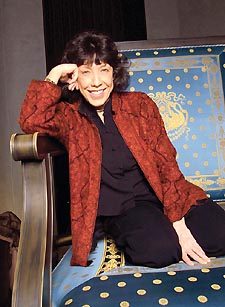 |
MW: How many years have you been together?
TOMLIN: Thirty-five this past March.
MW: That’s a long time. What’s your secret?
TOMLIN: I think just knowing that it takes real attention and caring and time and effort and work and knowing that it’s a commitment. And it’s respecting. I respect her talent and her brain and who she is as a person — and that kind of admiration and respect is a big factor in binding someone in a relationship. I know what a good heart she has, and how empathetic she is with all kinds of people and issues — she’s so brilliant on top of it that she can voice these things. And she’s as funny as she can possibly be. She makes me laugh.
MW: Now there’s a talent — to make Lily Tomlin laugh. You’re out, but you never had, to my recollection, a big coming out in the media.
TOMLIN: I certainly never called a press conference or anything like that. [Back in the ’70s,] people didn’t write about it. Even if they knew, they would [refer to Jane as] ”Lily’s collaborator,” things like that.
Some journalists are just motivated by their own sense of what they want to say or what they feel comfortable saying or writing about. In ’77, I was on the cover of Time. The same week I had a big story in Newsweek. In one of the magazines it says I live alone, and the other magazine said I live with Jane Wagner. Unless you were so really adamantly out, and had made some declaration at some press conference, people back then didn’t write about your relationship.
MW: Do you understand the justification for some celebrities not coming out?
TOMLIN: Listen, I have no judgment about anything. Some people will bring certain celebrities up to me who are presumably — or known to be — gay and ask “Why don’t they come out?” But we don’t know why they don’t, and it’s none of our business, really. In ’75 I was making the Modern Scream album, and Jane and I were in the studio. My publicist called me and said “Time will give you the cover if you’ll come out.” I was more offended than anything that they thought we’d make a deal. But that was ’75 — it would have been a hard thing to do at that time.
I was on [The Tonight Show] in 1973, and [Johnny] Carson said to me, ”You’re not married, are you?” And I said, ”No.” And he said, ”Don’t you want to have any children?” You could hear the audience stop dead. Because as a female, even to say you didn’t necessarily want to have a child or act out the traditional role of any kind was heavy. And the audience was like — a pin could drop. And I said, ”No, I don’t want to have any children” or something like that. Then I said, ”I like children but I don’t really want to have any children and raise them.” There was kind of a tense moment there, so I said to Carson, ”Who has custody of yours?” Because I knew he didn’t. I sort of laughed it off. But even to make a public statement like that was kind of hard to do in those days. ”What’s wrong with her? She’s not maternal? She doesn’t want to be a mother? She doesn’t want to be a wife.”
MW: Or course, now one of the big issues is gays and parenting.
TOMLIN: Oh, yeah, that’s perfectly fine for somebody who wants to. But at that time I didn’t want to — and I’m glad I don’t — have any children. God only knows what I would have done with them, poor things. I really do like kids, but there wouldn’t have been room in my life to raise children. I was so involved with my career and I would have had to give up the career in large part because I could not possibly have shortchanged the child.
MW: Do you think you would have been a good mother?
TOMLIN: Yes, I probably would have been. But I was selfish. I didn’t want to be.
MW: Do you ever regret not having kids?
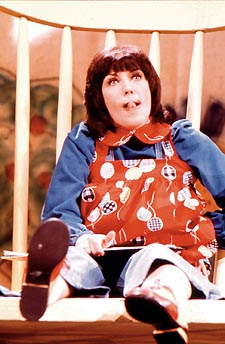 ‘Edith Ann’ |
TOMLIN: Not overly. I suppose after you really get past it, and they’re all in their thirties and they’re the adults they’re going to be…. Then the grandkids come then you’re thrilled. Jane’s sister — she’s a grandmother now — always says, ”I wish I could have skipped the parent part.” It’s hard to raise children and to do right by them. There are too many kids anyway. There’s too many people.
MW: Are you impressed by how far the GLBT movement has come in 35 years?
TOMLIN: Yes, I think it’s stunning, really. I’m amazed at what the movement has done, the strides they’ve made. It’s been remarkable. But then, for a minute I’ll think, ”Oh, God, the new generation is much more open and accepting,” and then you’ll find some pocket where kids or teenagers are really abusive towards gay kids in their community.
MW: How much of our success can be attributed to popular culture? There is a theory that entertainment like Will and Grace and Brokeback Mountain really help push full acceptance of gays into the mainstream.
TOMLIN: I think it’s more a symbiotic thing. Because I think that the stuff that activists and gays have done in the early part of the movement also created a possibility for a Will and Grace. They created a kind of appetite for it.
MW: Have you and Jane ever considered marriage?
TOMLIN: We’ve talked about it, but I don’t know if we’ll ever do it.
MW: Do you feel married?
TOMLIN: [Laughs.] Oh, yeah. My goodness, we’ve lived together all these years. I can’t even remember not living with Jane.
MW: My last question to you: Do you feel that humor has changed over the past several decades for the better or for the worse?
TOMLIN: I would say for the worse. It’s a more ridiculing, divisive humor today, especially with the advent of political incorrectness, which is a license to be as ridiculing and awful about certain groups.
MW: Do you ever watch things like South Park?
TOMLIN: No, I don’t really get a kick out of South Park. But that’s an example of [what I’m talking about]. It’s like bad kids getting together and they’re going to pull down their trousers and fart in your face or something. I’ve seen little boys do that. Once I was at a party in Malibu, and there were two kids running around, about 6 and 8. That’s all they kept doing, they’d run up to a table, fart, and then they’d giggle and laugh and run away. then they’d run back again in five or 10 minutes and do it again to somebody else. You don’t want them to do that when they’re 30.
But a lot of [today’s comedy] is what we called ”boy comedy” in the old days. Well, boy comedy has always prevailed anyway — a male sensibility has always prevailed — because they think girls are too soft, not hard-hitting, wimpy in some ways.
But I would not for the world not want to have them around. They represent part of the culture and they have something to express themselves. There should be room for everybody, absolutely, and then the culture is going to decide the prevailing weight. We can’t decide it individually. Nobody is here without a reason.
MW: How would you typify your own brand of comedy?
TOMLIN: I always had a different sensibility. I like a huge range of comedy — from broad and farcical, the most sensitive, the most understated. But I always wanted my comedy to be more embracing of the species rather than debasing of it.
Lily Tomlin will perform this Saturday, April 29, at 8 p.m., at Strathmore’s annual gala. Tickets range from $100 to $300 and include a post-concert dessert party. Call 301-581-5100 or visit www.strathmore.org.
Support Metro Weekly’s Journalism
These are challenging times for news organizations. And yet it’s crucial we stay active and provide vital resources and information to both our local readers and the world. So won’t you please take a moment and consider supporting Metro Weekly with a membership? For as little as $5 a month, you can help ensure Metro Weekly magazine and MetroWeekly.com remain free, viable resources as we provide the best, most diverse, culturally-resonant LGBTQ coverage in both the D.C. region and around the world. Memberships come with exclusive perks and discounts, your own personal digital delivery of each week’s magazine (and an archive), access to our Member's Lounge when it launches this fall, and exclusive members-only items like Metro Weekly Membership Mugs and Tote Bags! Check out all our membership levels here and please join us today!







